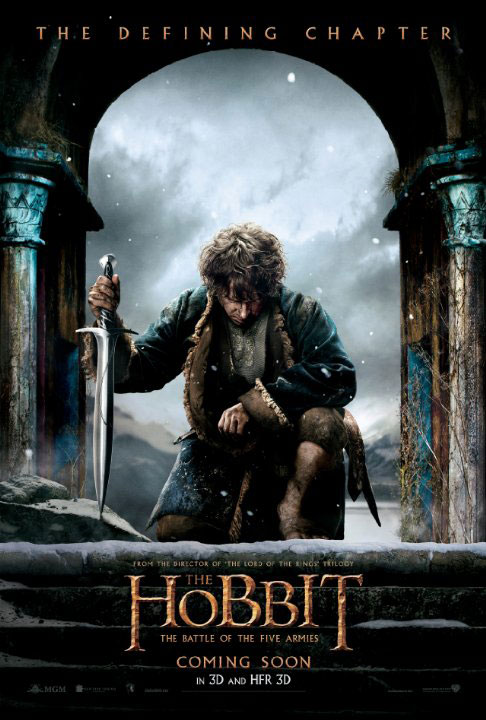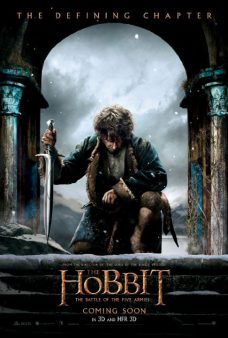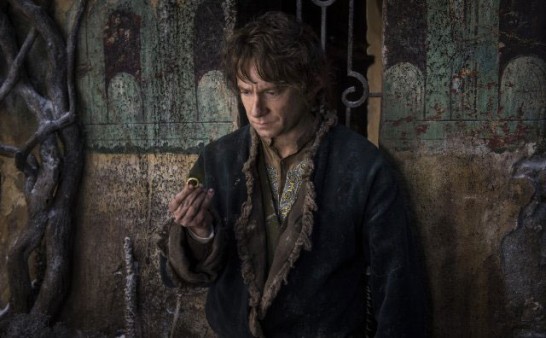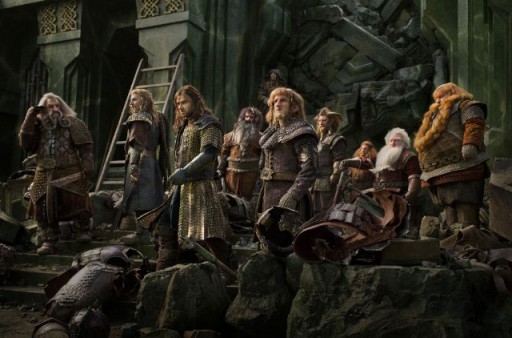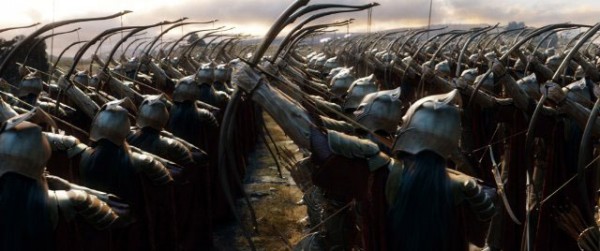– –
The Film
With The Battle of the Five Armies, Peter Jackson brings his long journey through the works of J.R.R. Tolkien’s works to a close, using his experiences with The Lord of the Rings films and the appendices from Tolkien’s Rings to create a sprawling epic.
One wouldn’t have thought it possible that The Hobbit, a slight book, could have made a compelling trilogy in comparison to its more natural triadic sibling, especially after the rather uneventful beginning, but the saga of hobbit Bilbo Baggins (Martin Freeman) and the dwarves, led by the journeyman-king Thorin Okenshield (Richard Armitage) finds its best story and dram yet in the action-packed finale, similar to what Jackson did with his work on The Lord of the Rings, bringing it to its peak in the final film.
Here, surprisingly, Bilbo is nearly relegated to minor status as the film begins where The Desolation of Smaug ended, with the avaricious dragon laying fiery waste to Lake-town, and the dwarves, the bowman Bard (Luke Evans) desperately trying to fell the giant monster. When the bowman manages to take Smaug (voiced by Benedict Cumberbatch; TV’s Sherlock; Star Trek Into Darkness) down with an ancient arrow, it finally clears the way for Thorin and his band of loyal followers to return to their home beneath the mountain. It’s a home filled with an uncountable amount of riches in gold and jewels, but Thorin soon finds himself succumbing to “dragon sickness,” the pleonexia that affects almost all of the dwarf rulers under the mountain, doomed to coveting their treasure above all. It is only made worse by his failure to find the king’s jewel, the Arkenstone that belongs to the ruler of the dwarves. When Bilbo notices the change in Thorin, he hides the Arkenstone away, but this is the least of the troubles. Thorin has gone back on his promise to the men of Lake-town to pay them for their assistance, and the Elvin leader Thranduil (Lee Pace; TV’s Halt and Catch Fire) also holds claim to Elvish jewels being held under the mountain. This sets up an enormous battle between the dwarves, and the men and Elves allied against them. However, a massive Orc army, sent to keep the dwarves from reclaiming the mountain so that Sauron can regain a strategic foothold, is also bearing down on everyone.
This final installment has everything one wished the first two Hobbit films had, those are an involving story, great characters, stunning action, and even some humor – Ryan Gage is the perfect comic relief in the classic Shakespearean manner as Alfrid, the cretinous Lake-town bootlicker. Jackson also gives us a star-crossed love story between the elf Tauriel (Evangeline Lilly) and dwarf Kili (Aidan Turner), but far from being syrupy, this only serves to help heighten the tension in the film’s climactic closing battle sequences that also involves giant orcs, Legolas (Orlando Bloom; The Three Musketeers) on a crumbling bridge in a sword fight like a modern day Errol Flynn, a cracking frozen lake, giant bats, and giant eagles.
Yes, rather than giving us another ponderous, transitional film, Peter Jackson has delivered the goods, even if it has taken three films to get us here. But far from being just a splendid actioner, The Battle of the Five Armies does do what was promised with An Unexpected Journey, in that it shows us the growth of a young hobbit, Bilbo, from an uptight, naïve, homebody into a valorous and even more friendly man.
Even with all of that there’s just a little something missing from The Battle of the Five Armies. It feels like a film that lacks some closure. It’s perhaps an unavoidable trap being that The Hobbit precedes the events of The Lord of the Rings, even if Peter Jackson takes some liberties with the original source material. Anyone familiar with what is to come next will be left feeling just a little hollow, and Jackson doesn’t help, choosing to end this film on the beginnings of The Fellowship of the Ring.
Our Movie Rating
[Rating:4.5/5]

